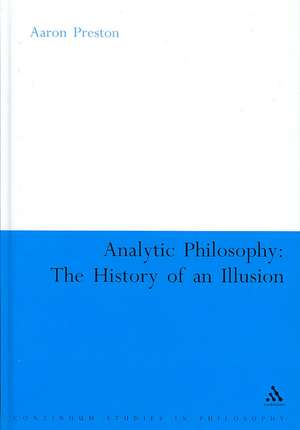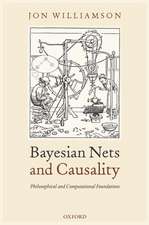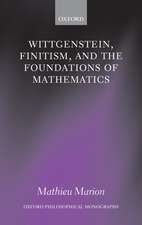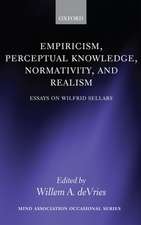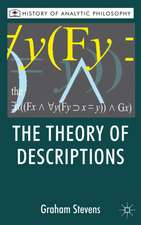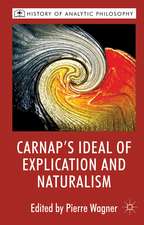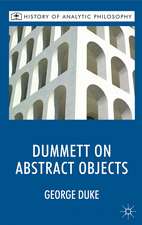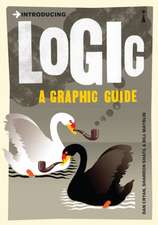Analytic Philosophy: The History of an Illusion: Continuum Studies in Philosophy
Autor Professor Aaron Prestonen Limba Engleză Hardback – 27 mar 2007
| Toate formatele și edițiile | Preț | Express |
|---|---|---|
| Paperback (1) | 256.20 lei 6-8 săpt. | |
| Bloomsbury Publishing – 13 oct 2010 | 256.20 lei 6-8 săpt. | |
| Hardback (1) | 889.49 lei 6-8 săpt. | |
| Bloomsbury Publishing – 27 mar 2007 | 889.49 lei 6-8 săpt. |
Din seria Continuum Studies in Philosophy
-
 Preț: 255.58 lei
Preț: 255.58 lei -
 Preț: 256.59 lei
Preț: 256.59 lei - 22%
 Preț: 256.29 lei
Preț: 256.29 lei - 31%
 Preț: 890.62 lei
Preț: 890.62 lei - 18%
 Preț: 304.66 lei
Preț: 304.66 lei -
 Preț: 254.93 lei
Preț: 254.93 lei - 24%
 Preț: 249.00 lei
Preț: 249.00 lei - 31%
 Preț: 890.86 lei
Preț: 890.86 lei - 22%
 Preț: 1064.84 lei
Preț: 1064.84 lei - 31%
 Preț: 947.54 lei
Preț: 947.54 lei - 23%
 Preț: 255.11 lei
Preț: 255.11 lei - 31%
 Preț: 888.74 lei
Preț: 888.74 lei - 31%
 Preț: 890.72 lei
Preț: 890.72 lei - 22%
 Preț: 1005.49 lei
Preț: 1005.49 lei - 22%
 Preț: 946.72 lei
Preț: 946.72 lei -
 Preț: 254.75 lei
Preț: 254.75 lei - 22%
 Preț: 1005.98 lei
Preț: 1005.98 lei -
 Preț: 255.19 lei
Preț: 255.19 lei - 31%
 Preț: 889.15 lei
Preț: 889.15 lei - 31%
 Preț: 1006.06 lei
Preț: 1006.06 lei - 22%
 Preț: 889.23 lei
Preț: 889.23 lei - 22%
 Preț: 947.86 lei
Preț: 947.86 lei - 22%
 Preț: 256.49 lei
Preț: 256.49 lei - 31%
 Preț: 888.58 lei
Preț: 888.58 lei - 14%
 Preț: 1006.24 lei
Preț: 1006.24 lei - 31%
 Preț: 891.51 lei
Preț: 891.51 lei - 22%
 Preț: 1005.89 lei
Preț: 1005.89 lei -
 Preț: 256.38 lei
Preț: 256.38 lei - 31%
 Preț: 1152.60 lei
Preț: 1152.60 lei - 23%
 Preț: 255.38 lei
Preț: 255.38 lei - 22%
 Preț: 1006.72 lei
Preț: 1006.72 lei - 31%
 Preț: 946.72 lei
Preț: 946.72 lei - 22%
 Preț: 257.76 lei
Preț: 257.76 lei - 22%
 Preț: 1005.18 lei
Preț: 1005.18 lei -
 Preț: 256.49 lei
Preț: 256.49 lei -
 Preț: 256.38 lei
Preț: 256.38 lei - 31%
 Preț: 1003.53 lei
Preț: 1003.53 lei -
 Preț: 258.42 lei
Preț: 258.42 lei - 19%
 Preț: 464.39 lei
Preț: 464.39 lei - 22%
 Preț: 1005.89 lei
Preț: 1005.89 lei - 22%
 Preț: 1005.56 lei
Preț: 1005.56 lei - 11%
 Preț: 465.66 lei
Preț: 465.66 lei - 22%
 Preț: 1006.62 lei
Preț: 1006.62 lei - 13%
 Preț: 255.66 lei
Preț: 255.66 lei
Preț: 889.49 lei
Preț vechi: 1140.49 lei
-22% Nou
Puncte Express: 1334
Preț estimativ în valută:
170.23€ • 177.06$ • 140.53£
170.23€ • 177.06$ • 140.53£
Carte tipărită la comandă
Livrare economică 15-29 aprilie
Preluare comenzi: 021 569.72.76
Specificații
ISBN-13: 9780826490032
ISBN-10: 0826490034
Pagini: 208
Dimensiuni: 156 x 234 x 21 mm
Greutate: 0.45 kg
Editura: Bloomsbury Publishing
Colecția Continuum
Seria Continuum Studies in Philosophy
Locul publicării:London, United Kingdom
ISBN-10: 0826490034
Pagini: 208
Dimensiuni: 156 x 234 x 21 mm
Greutate: 0.45 kg
Editura: Bloomsbury Publishing
Colecția Continuum
Seria Continuum Studies in Philosophy
Locul publicării:London, United Kingdom
Caracteristici
Though analytic philosophy is known for focusing sharply on narrowly defined problems, the book keeps the big picture in view by relating analytic philosophy's origin to broad philosophical, historical, scientific, and social issues
Cuprins
Preface
Introduction: The Peculiar Career of Analytic Philosophy
Part I: The Crises in Analytic Philosophy
1. The Identity Crisis in Analytic Philosophy
2. A Crisis within the Crisis: The Problem of Revisionist History
3. Against Revisionism
4. On the Trail of an Illusion
Part II: Scientism and the Emergence of Analytic Philosophy 5. The Root of the Illusion of Unity
6. The Root of the Illusion of Promise
7. Conclusion
Notes
Bibliography
Introduction: The Peculiar Career of Analytic Philosophy
Part I: The Crises in Analytic Philosophy
1. The Identity Crisis in Analytic Philosophy
2. A Crisis within the Crisis: The Problem of Revisionist History
3. Against Revisionism
4. On the Trail of an Illusion
Part II: Scientism and the Emergence of Analytic Philosophy 5. The Root of the Illusion of Unity
6. The Root of the Illusion of Promise
7. Conclusion
Notes
Bibliography
Index
Recenzii
Journal for the History of Philosophy, 2009
"Preston is to be congratulated on having put the need for this sort of important investigation so firmly on the agenda."Philosophical Investigations
'...a significant contribution to the literature on the history of analytic philosophy - one that should stimulate much discussion and further work on the subject...a "must read" book for the field.' John Ongley, Editor, The Bertrand Russell Society Quarterly.
'Aaron Preston has written an extremely clear and richly provocative book on the nature of analytic philosophy' William Larkin, Notre Dame Philosophical Reviews
'Well documented, detailed, cogent, clear, fascinating, often convincing, and always fun to read...This book is essential reading for anyone who wants to understand philosophy's contemporary situation - and how to get out of it.' Professor John McCumber, UCLA, USA
"There is much to admire in this book. It is beautifully written, and it draws on discoveries from an impressive range of fields. Preston finds instruction in metaphilosophy and the sociology of philosophy as well as in the latest scholarship on the history of early analytic thought. He makes an important contribution simply by bringing work from these disparate fields together...Preston makes a compelling case that analytic philosophy has never been as unified as we usually assume. He also argues convincingly that our failure to see this results from biases that are largely unphilosophical...Preston has not said the last word about the history and the problems of analytic philosophy. But he has made important discoveries about it, some of which are genuinely troubling. Future histories will have to take his discoveries seriously." -Robert Piercy, Philosophy in Review
"This is an important book which, given the limited resources available at this point in the history of Analytic Philosophy, makes a highly persuasive case as to the nature and peculiarities of the discipline. It deserves a wide audience among analytic philosophers, and amongst anyone interested in the "peculiar career" of Analytic Philosophy..." "What is lost in a review such as this is the wealth of detail that Preston deploys in making his overall case...The great service that Preston has done is to illustrate precisely why history matters to philosophy, and most particularly to Analytic Philosophy, which arguably is now suffering from the ahistorical attitudes it has nursed for more than fifty years. What needs to happen now is a full revival of the history of AP as a serious and respected area of philosophical study. In this task, British analytic philosophy has a lot to do to catch up with the valuable work being done by Preston and others in the United States." - Thomas Akehurst, History of European Ideas, 2009
From Kevin Robb, Professor of Philosophy (University of Southern California): Aaron Preston's book is an insightful study of what he rightly describes as "the peculiar career" of Analytic Philosophy. Preston's views are original and iconoclastic, going beyond the received view of analytic philosophy's history to link it to broader developments in the history of thought. His book makes an important contribution to the growing literature on analytic philosophy, and especially its history in the past century, one that will be of value to specialists and non-specialists alike.
From Michael Beaney, University of York (UK): Preston writes in a very engaging and lucid style...Throughout, his writing is informed by an historiographical sensitivity and historical self-consciousness that is rarely found in philosophers trained in the analytic tradition
"Preston is to be congratulated on having put the need for this sort of important investigation so firmly on the agenda."Philosophical Investigations
'...a significant contribution to the literature on the history of analytic philosophy - one that should stimulate much discussion and further work on the subject...a "must read" book for the field.' John Ongley, Editor, The Bertrand Russell Society Quarterly.
'Aaron Preston has written an extremely clear and richly provocative book on the nature of analytic philosophy' William Larkin, Notre Dame Philosophical Reviews
'Well documented, detailed, cogent, clear, fascinating, often convincing, and always fun to read...This book is essential reading for anyone who wants to understand philosophy's contemporary situation - and how to get out of it.' Professor John McCumber, UCLA, USA
"There is much to admire in this book. It is beautifully written, and it draws on discoveries from an impressive range of fields. Preston finds instruction in metaphilosophy and the sociology of philosophy as well as in the latest scholarship on the history of early analytic thought. He makes an important contribution simply by bringing work from these disparate fields together...Preston makes a compelling case that analytic philosophy has never been as unified as we usually assume. He also argues convincingly that our failure to see this results from biases that are largely unphilosophical...Preston has not said the last word about the history and the problems of analytic philosophy. But he has made important discoveries about it, some of which are genuinely troubling. Future histories will have to take his discoveries seriously." -Robert Piercy, Philosophy in Review
"This is an important book which, given the limited resources available at this point in the history of Analytic Philosophy, makes a highly persuasive case as to the nature and peculiarities of the discipline. It deserves a wide audience among analytic philosophers, and amongst anyone interested in the "peculiar career" of Analytic Philosophy..." "What is lost in a review such as this is the wealth of detail that Preston deploys in making his overall case...The great service that Preston has done is to illustrate precisely why history matters to philosophy, and most particularly to Analytic Philosophy, which arguably is now suffering from the ahistorical attitudes it has nursed for more than fifty years. What needs to happen now is a full revival of the history of AP as a serious and respected area of philosophical study. In this task, British analytic philosophy has a lot to do to catch up with the valuable work being done by Preston and others in the United States." - Thomas Akehurst, History of European Ideas, 2009
From Kevin Robb, Professor of Philosophy (University of Southern California): Aaron Preston's book is an insightful study of what he rightly describes as "the peculiar career" of Analytic Philosophy. Preston's views are original and iconoclastic, going beyond the received view of analytic philosophy's history to link it to broader developments in the history of thought. His book makes an important contribution to the growing literature on analytic philosophy, and especially its history in the past century, one that will be of value to specialists and non-specialists alike.
From Michael Beaney, University of York (UK): Preston writes in a very engaging and lucid style...Throughout, his writing is informed by an historiographical sensitivity and historical self-consciousness that is rarely found in philosophers trained in the analytic tradition
